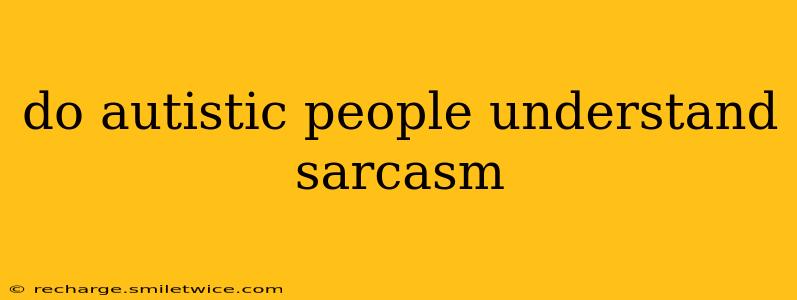Do Autistic People Understand Sarcasm?
The simple answer is: it depends. While some autistic individuals struggle to understand sarcasm, many others grasp it perfectly well. The ability to understand sarcasm isn't solely determined by an autism diagnosis; rather, it's a complex cognitive skill influenced by a multitude of factors, including individual differences, communication style, and the context of the interaction.
Let's delve deeper into this nuanced topic.
What Makes Understanding Sarcasm Difficult?
Sarcasm relies heavily on non-literal language and social cues. It involves detecting incongruity between what's said and what's meant, requiring the listener to interpret the speaker's intention beyond the surface meaning of words. Many autistic individuals face challenges in:
- Interpreting nonverbal cues: Facial expressions, tone of voice, and body language often play a crucial role in conveying sarcasm. Difficulties processing these subtle cues can make identifying sarcasm challenging.
- Understanding social context: Sarcasm is highly context-dependent. Understanding the relationship between speakers, the overall situation, and the speaker's history is vital for accurate interpretation. Difficulties with social cognition can lead to misinterpretations.
- Detecting implied meaning: Sarcasm often involves indirect communication, relying on the listener to "read between the lines." This requires strong inferential skills, which may pose challenges for some autistic individuals.
- Recognizing intent: Accurately discerning whether a statement is intended sarcastically hinges on understanding the speaker's intent. This can be particularly difficult when the tone of voice isn't clearly indicative of sarcasm.
How Autistic People Can Understand Sarcasm
It's crucial to avoid generalizations. Many autistic individuals excel at understanding sarcasm, often employing different strategies to decipher it:
- Focus on Literal Meaning First: Some autistic individuals may initially process the literal meaning of the statement before considering the context for potential sarcasm. This methodical approach can, ironically, lead to accurate interpretation if combined with careful observation of other social cues.
- Strong Analytical Skills: Autistic individuals often possess exceptional analytical skills. This can be advantageous in dissecting the nuances of language and identifying inconsistencies that hint at sarcasm.
- Learning Through Experience: Like anyone else, autistic individuals learn and improve their understanding of sarcasm through repeated exposure and experience.
How to Communicate Effectively with Autistic Individuals:
- Be clear and direct: Avoid relying heavily on sarcasm or indirect communication.
- Use explicit language: If you intend to be sarcastic, clearly state your intentions ("I'm only joking," "That's ironic," etc.).
- Pay attention to their responses: Observe their reactions to gauge whether they understand your communication. If they seem confused, clarify your statement.
- Be patient and understanding: Remember that difficulties understanding sarcasm are not a reflection of intelligence or ability.
Frequently Asked Questions (FAQ)
Do all autistic people have difficulty understanding figurative language, including sarcasm? No, not all autistic individuals struggle with figurative language. The ability to understand sarcasm, like any other cognitive skill, varies widely among individuals.
Can autistic individuals learn to understand sarcasm? Yes, many autistic individuals learn to understand sarcasm over time through experience and explicit instruction. Practicing interpretation of sarcastic remarks in safe and supportive settings can be beneficial.
Is there a correlation between autism severity and the ability to understand sarcasm? There is no direct, universally applicable correlation between autism severity and the ability to understand sarcasm. Individual differences play a much larger role.
What are some strategies to help autistic individuals understand sarcasm? Providing explicit explanations, using clear and direct language, and focusing on contextual cues are effective strategies. Creating a safe environment for asking questions and clarifying meanings is also important.
In conclusion, the ability to understand sarcasm in autistic individuals is highly variable and shouldn't be used as a measure of their intelligence or social skills. Empathy, understanding, and clear communication are key to fostering effective interactions.
